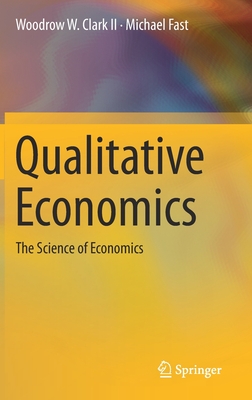Qualitative Economics: The Science of Economics
暫譯: 質性經濟學:經濟學的科學
Clark II, Woodrow W., Fast, Michael
- 出版商: Springer
- 出版日期: 2019-10-17
- 售價: $4,910
- 貴賓價: 9.5 折 $4,665
- 語言: 英文
- 頁數: 386
- 裝訂: Hardcover - also called cloth, retail trade, or trade
- ISBN: 3030059367
- ISBN-13: 9783030059361
-
相關分類:
經濟學 Economy
海外代購書籍(需單獨結帳)
相關主題
商品描述
This book provides a new paradigm of economics that is called: qualitative economics. The authors take an approach to economics that is entirely different from the established neo-classical economics paradigm. Arguing that the basis of neo-classical economic theory with its focus on perfect information in a balanced equilibrium system of supply and demand is fundamentally flawed, the authors propose an inclusive philosophical and scientific perspective to explain economic structures and activities and how best to understand the dynamics of economics.
Furthermore, the authors argue that a qualitative approach allows for greater understanding of not only the actors, actions and situations in economics, but also defines the context in which the more traditional quantitative and statistical methods are applied. The book includes case studies to further illustrate the applications of qualitative economics. Challenging orthodox paradigms and schools of economic thought, the book proposes a new way of looking at economics, and as such will be of use to researchers and students of economics, business, social sciences and the sciences as well as think tanks and advocacy groups interested in heterodox economics.
商品描述(中文翻譯)
這本書提供了一種新的經濟學範式,稱為:質性經濟學。作者採取了一種與既有的新古典經濟學範式完全不同的經濟學觀點。作者主張,新古典經濟理論以供需平衡系統中的完美資訊為重心的基礎是根本有缺陷的,因此提出了一種包容性的哲學和科學視角,以解釋經濟結構和活動,以及如何最佳理解經濟的動態。
此外,作者認為,質性方法不僅能更深入理解經濟中的行為者、行動和情境,還能定義更傳統的定量和統計方法所應用的背景。這本書包含案例研究,以進一步說明質性經濟學的應用。挑戰正統的範式和經濟思想學派,這本書提出了一種新的經濟學觀點,因此將對經濟學、商業、社會科學及自然科學的研究者和學生,以及對異端經濟學感興趣的智庫和倡導團體有所幫助。
作者簡介
Clark is an internationally recognized, respected expert, author, lecturer, public speaker and consultant on global and local solutions to climate change. His core focus is on economics for smart green healthy communities. He is now (2018) Research Professor in Economics at Pepperdine University Graziadio School of Business (PGSB). From 2000-2003, Clark was Advisor, Renewable Energy, Emerging Technologies & Finance to California Governor Gray Davis. In 2004, Clark founded, and manages Clark Strategic Partners (CSP), a global environmental and renewable energy consulting firm.
Clark has published over a dozen books by the end of 2017 and over 70 peer-reviewed articles, which reflect his concern for global sustainable green communities. He has authored and edited books such as The Next Economics (Springer, 2012) and Global Sustainable Communities Handbook (Elsevier, 2014). In addition, his latest co-authored books, with Grant Cooke, are The Green Industrial Revolution (Elsevier, 2014), Green Development Paradigm (in Mandarin, 2015) and Smart Green Cities (Routledge, February 2016). In 2017, Clark had three (3) books published, 2nd Ed of his first book: Agile Energy Systems: Global Systems (Elsevier Press) and 2nd Ed of Sustainable Communities Design Handbook (Elsevier Press 2017).
Three more books are out in 2018: Climate Preservation (Elsevier Press) and Qualitative Economics 2nd Ed (Springer Press). Then later in fall of 2018, Economics as a Science: Qualitative and Quantitative Economics (Q2E) from Palgrave Press. And in 2019, Sustainable Mega Cities (Elsevier Press).
Michael Fast, MSc, PhD
Fast has been working in the field of business economics for more than 30 years, with a focus in research and teaching in organizational sociology, leadership philosophy, philosophy of science, methodology and qualitative methods. He is Research group leader of ORCA (Organizational Renewal Creativity Applied), Former member of the Study Board Business and Economics, and Program coordinator of the BSc program in Economics Business and Administration. Former vice head of Department of Development and Planning, Aalborg University. He had and is supervising Ph.D. fellows in those fields.
Fast has published articles and book in all above mention areas, whit focuses up on qualitative perspective as Phenomenology, Hermeneutics, Symbolic Interactionism and Critical Theory. Central have been the matter of understanding people and organizations, leadership, being, cognition and everyday of life in business. He had all the time tried to develop the philosophical consciousness in writing and teaching of business economics, and develop alternatives to mainstream thinking.作者簡介(中文翻譯)
**伍德羅·W·克拉克二世 (Woodrow W. Clark II), MA3, PhD**
克拉克是一位國際公認且受人尊敬的專家、作者、講師、公共演講者及氣候變遷的顧問,專注於全球及地方的解決方案。他的核心重點是針對智慧、綠色及健康社區的經濟學。自2018年起,他擔任佩珀代因大學格拉齊亞迪商學院 (Pepperdine University Graziadio School of Business, PGSB) 的經濟學研究教授。2000年至2003年,克拉克擔任加州州長格雷·戴維斯 (Gray Davis) 的可再生能源、新興技術及金融顧問。2004年,克拉克創立並管理克拉克戰略夥伴公司 (Clark Strategic Partners, CSP),這是一家全球環境及可再生能源顧問公司。
截至2017年底,克拉克已出版超過十本書籍及70篇以上的同行評審文章,這些作品反映了他對全球可持續綠色社區的關注。他撰寫及編輯的書籍包括《下一個經濟學》(The Next Economics, Springer, 2012) 和《全球可持續社區手冊》(Global Sustainable Communities Handbook, Elsevier, 2014)。此外,他與格蘭特·庫克 (Grant Cooke) 共同撰寫的最新書籍包括《綠色工業革命》(The Green Industrial Revolution, Elsevier, 2014)、《綠色發展範式》(Green Development Paradigm, 中文版, 2015) 及《智慧綠色城市》(Smart Green Cities, Routledge, 2016年2月)。在2017年,克拉克出版了三本書,包括他的第一本書的第二版:《敏捷能源系統:全球系統》(Agile Energy Systems: Global Systems, Elsevier Press) 及《可持續社區設計手冊》(Sustainable Communities Design Handbook, Elsevier Press 2017) 的第二版。
在2018年還有三本書出版: 《氣候保護》(Climate Preservation, Elsevier Press) 和《定性經濟學第二版》(Qualitative Economics 2nd Ed, Springer Press)。然後在2018年秋季,出版了《經濟學作為一門科學:定性與定量經濟學》(Economics as a Science: Qualitative and Quantitative Economics, Q2E, Palgrave Press)。在2019年,出版了《可持續大城市》(Sustainable Mega Cities, Elsevier Press)。
**邁克爾·法斯特 (Michael Fast), MSc, PhD**
法斯特在商業經濟學領域工作超過30年,專注於組織社會學、領導哲學、科學哲學、方法論及定性方法的研究與教學。他是ORCA (組織更新創造力應用) 的研究小組負責人,曾任商業與經濟學研究委員會成員,以及經濟學商業與管理學士學位課程的計畫協調員。曾任奧爾堡大學發展與規劃系副主任。他曾指導並正在指導這些領域的博士研究生。
法斯特在上述所有領域發表了文章和書籍,重點關注定性視角,如現象學、詮釋學、符號互動主義及批判理論。核心問題是理解人與組織、領導、存在、認知及商業日常生活。他一直試圖在商業經濟學的寫作和教學中發展哲學意識,並發展主流思維的替代方案。












